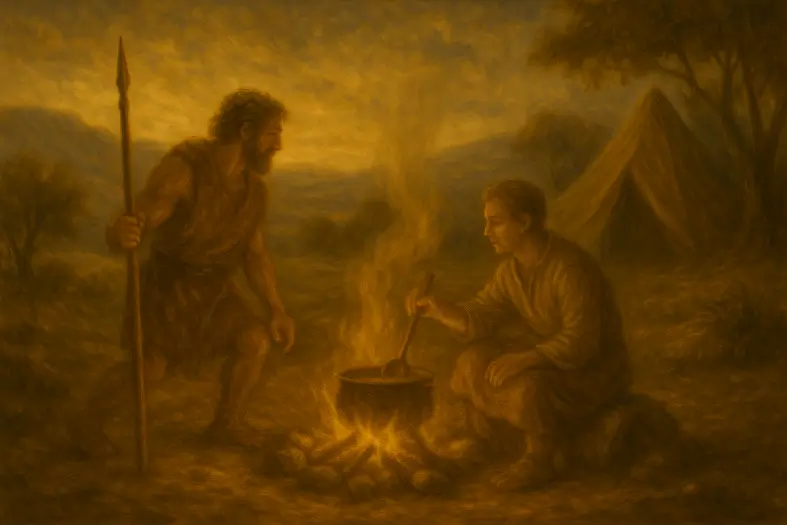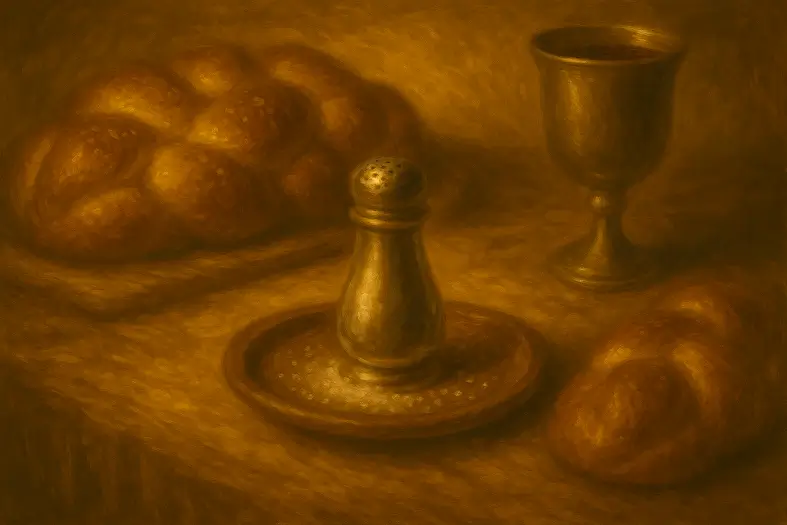
The Mitzvah Minute newsletter brings the beauty of Torah learning to your inbox — exploring mitzvot, parsha insights, and timeless Jewish wisdom in a clear, uplifting format. Browse our latest issue below, or explore past editions to keep growing one mitzvah at a time.

“And you shall teach them diligently to your children…” — Deuteronomy 6:7
At the heart of Toldot lies the struggle over who will continue the covenant. The mitzvah of Talmud Torah restores that central question: Torah is not simply knowledge — it is transmission.
Chazal teach that one who teaches Torah “is as though he has given birth to the student” (Sanhedrin 19b). In a parsha that revolves around contested inheritance, Torah study emerges as Judaism’s true generational bond — the act that shapes identity, sustains memory, and carries faith forward.
Explore the full mitzvah →
Read Mitzvah 22 on Mitzvah Minute ↗

Toldot unfolds the tension between image and essence, between the external birthright and the inner covenantal mission. Yitzchak digs anew the wells of Avraham, teaching that spiritual life is sustained not by novelty, but by loyal renewal & Avodah.
Yaakov and Eisav represent divergent orientations toward destiny: one driven by appetite, the other drawn to covenantal responsibility. The parsha asks: Who shoulders the work? Who embodies the tradition?
In that sense, Toldot is a study in avodah — the labor of maintaining, clarifying, and transmitting the spiritual foundations laid by the previous generation.
Read the Parsha insight →
Discover Toldot on Mitzvah Minute ↗

A Dvar Torah on Parshat Toldot
This week’s feature essay reframes the famous stew-for-birthright exchange as far more than a dramatic family episode. Drawing on Rashi, Ramban, Sforno, Rambam, Ralbag, Abarbanel, Rav Kook, Chassidus, Rabbi Sacks, and R’ Avigdor Miller, it argues that Toldot is the Torah’s laboratory for covenantal identity.
Esav sees the bechorah as liability — a burden of avodah attached to danger, discipline, and deferred reward. Yaakov sees it as responsibility — the privilege of standing in the service of Hashem. The sale exposes not naïveté but character: one brother governed by appetite and immediacy, the other ordered by mind, commitment, and future. Later commentaries read the struggle as internal as well as historical — the Esav-voice of impulse against the Yaakov-voice of purpose.
In this light, the birthright becomes a test of what one values when no one is watching: service over status, long-term covenant over short-term craving. Toldot challenges us to ask whether our daily choices flow from instinct or intention — whether we are selling our spiritual future for a moment of “the red stuff,” or actively inheriting Avraham’s calling through Torah, avodah, and disciplined character.
Read the full essay →
The Birthright and the Power to Choose ↗

Salt appears marginal in everyday life, yet within Torah it becomes a structural symbol of covenant, endurance, and elevation. This week’s essay traces how “with all your offerings you shall offer salt” (Vayikra 2:13) anchors salt in the earliest moments of Creation. Rashi and Bereishis Rabbah describe salt as fulfilling a primordial promise to the “lower waters,” while Ramban develops its theological depth — salt preserves, enhances, and in excess destroys; it therefore becomes the emblem of a covenant that is both enduring and exacting.
Across Tanach and Chazal, salt functions as purifier, boundary-maker, and transformative agent: from Lot’s wife to the Davidic kingship’s “bris melach,” from melichah in kashrut to the altar where every korban requires salt (Menachos 20a). At the Jewish table, salt turns bread into an offering, and dipping challah becomes a small reenactment of Divine service — sweetening judgment, grounding covenant, and elevating the ordinary. In this lens, salt is not seasoning but symbol: permanence, refinement, and the quiet preservation of holiness within daily life.
Read the full essay →
The Covenant of Salt: Why Jewish Life Begins With a Pinch of Salt ↗






If Vayeira taught us about the openness of Avraham’s tent, Toldot teaches us about the labor of keeping that tent standing.
Learning Torah is not only acquiring wisdom; it is participating in a lineage of avodah — work done with heart, discipline, and continuity.
In every generation, the question of Toldot returns: Who will carry the covenant forward?
The answer is renewed each time we learn, teach, and choose the path of sacred responsibility.


Dive into mitzvot, prayer, and Torah study—each section curated to help you learn, reflect, and live with intention. New insights are added regularly, creating an evolving space for spiritual growth.

Explore the 613 mitzvot and uncover the meaning behind each one. Discover practical ways to integrate them into your daily life with insights, sources, and guided reflection.

Learn the structure, depth, and spiritual intent behind Jewish prayer. Dive into morning blessings, Shema, Amidah, and more—with tools to enrich your daily connection.

Each week’s parsha offers timeless wisdom and modern relevance. Explore summaries, key themes, and mitzvah connections to deepen your understanding of the Torah cycle.
